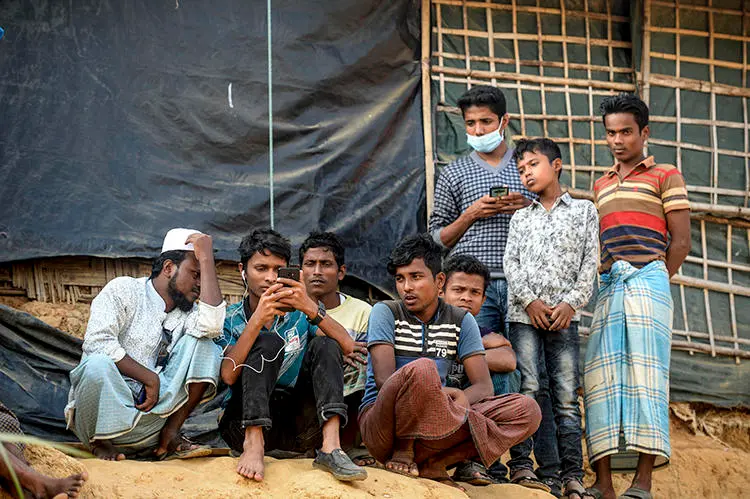Ro Sawyeddollah has lived in a refugee camp in Cox’s Bazar, Bangladesh, since he fled Myanmar along with thousands of other ethnic Rohingya in 2017, where the U.N. found that Rohingya live under threat of genocide.
After arriving in Bangladesh, Ro Sawyeddollah was trained in citizen journalism by the World Food Program’s Storyteller initiative. His writing and photos have been featured in outlets such as the local Frontier Myanmar news website and French news wire France24, and he has worked as a fixer for international outlets like The Economist.
Since late 2019, the Bangladesh government has cut off internet access to Cox’s Bazar and blocked refugees from obtaining SIM cards, citing a black market in the camps to evade regulations that only Bangladeshis with national identification cards are allowed to obtain SIM cards and access the internet, according to news reports.
There are over 800,000 Rohingya refugees in Bangladesh, according to the United Nations. There have not been any confirmed COVID-19 cases in the refugee camps, but there have been positive tests in nearby communities, according to reports.
Ro Sawyeddollah lives in Camp 15, one of many fenced-in areas housing refugees around Cox’s Bazar. He used an internet connection shared by a friend to speak with CPJ via phone calls and messaging app in late April. His responses have been edited for length and clarity.
What kind of restrictions do you face in your reporting?
On our phones, there is no 3G or 4G. Just 2G. We are also not allowed to access Wi-Fi; you have to have a Bangladeshi identity card to have either Wi-Fi or a SIM card. If any authority knew I was using Wi-Fi [provided by my friend], they would take state action against us.
Now, we can’t even go to other nearby camps. Before the global outbreak of COVID-19, we were able to at least go and visit other camps—but it was limited. Now, there is a boundary that we can’t cross; there’s a checkpoint at the edge of the camp.
How are you covering the virus in the camps?
There are a lot of people living in these camps. Some NGOs and social workers are here providing some general information about COVID-19, but it’s not enough information to be prepared.
So, some youths in the community—like myself—who have found ways to access the internet, have been collecting more detailed information online. And we are going door to door helping to spread it, trying to make sure each family has accurate information to prepare.
We can do this now because COVID-19 hasn’t reached the camp. But, imagine when it does. At that time, we won’t have any options. How can we go door to door to explain? Many, many people don’t know what COVID-19 is. Knowing about it is very important to protect our community.
Right now, we are really worried. If we had the internet, we wouldn’t have to go door to door! We could just spread news and awareness online, like other people do. Mostly, people already have smartphones in the camps, so it wouldn’t be that difficult to spread the news over the network—if we had access.
If COVID reaches the camp, at that time, we may have no options. Dying will be the option, because we cannot make people aware of how to be safe.
How are these restrictions impacting your ability to work with international media?
The internet blockage has made it very difficult for us to communicate with international news outlets who are interested in doing stories from Cox’s Bazar.
I would like the international media to make daily stories about our situation. In this hard time, the internet is a golden tool for getting help and required information. And now, we are excluded from using this tool.
And it’s not only that that the internet doesn’t work. Sometimes phone calls don’t work too.
How do these restrictions affect the spread of news?
It’s very difficult to gather information about the camp, even from within the camp. And now we have restrictions on our movement, too.
Before the outbreak of COVID-19, we used to collect important and emergency information through in-person conversation. But now we can’t leave the camp, we can’t meet with people we want. So, now we don’t have any way to see the accurate picture of the situation.
Even though I myself am able to read news when I use Wi-Fi—and it’s easy for me to get an update on COVID-19—it’s impossible for me to share those updates with my people.
Using the internet isn’t a crime. I’m trying to raise the voices of my community. I am trying to motivate my community, and I am trying to get the world to hear.
